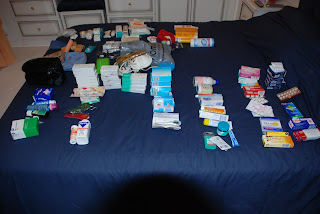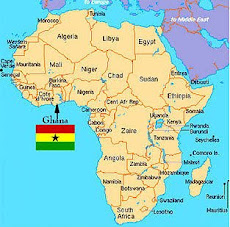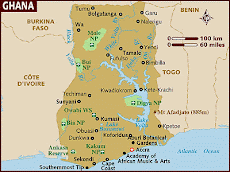
Well, we have made it to Wa. We enjoyed getting to know Accra a little bit, although it is a very busy, sprawling city, with traffic jams everywhere.
The 8, volunteers in the picture are all based in and around Wa. They come from Canada, Australia, Kenya, Liverpool and Derby. The other picture shows all the volunteers who have arrived in Ghana this September. Everyone is incredibly supportive.Settling into this new environment doesn’t come easy, even after having lived or travelled quite extensively in developing countries, as all of us have done.


The journey to Wa was by coach, which was packed to the ceiling with people and luggage. The whole journey took just over 15 hours and it was a real challenge. However, it was fascinating to travel the whole length of Ghana and watch life going on in every town and village that we passed through. We had about 5 brief stops on route and on each occasion, there were people try to sell us everything you could possible imagine, very reminiscent of the railway stations in India. As in India, everyone was polite, friendly and good humoured.

We are now in our house and settling in to doing priority tasks, like trying to work out how our water filters function, as well as putting up our mosquito net.
We are becoming friends with all the local ants, lizards, spiders and cockroaches that also enjoy living in this house. The house is connected to a mains water supply, but it only comes on for between 1 and 3 hours from 04.00 to 07.00 a.m. The water has to be collected in barrels. Water for drinking and cooking has to be filtered and then boiled. We have to use buckets for showering, and we are anticipating our first attempt at this with just a little trepidation.
The work they want us to do sounds very exciting. We will find out more detail over the next few days, but we will definitely be working with the Director and her staff in the education service, as well as with headteachers and their teams in a number of local schools. We walked to the education offices today, during the hottest part of the afternoon, just to check how best to mange it. It took 45 minutes each way, with lots of drinking on route. We hope to be able to buy bicycles soon, to help us get between the education offices and the schools.
We have practised our very basic Waali with all the people we have met so far. Our simple greetings cause great amusement and this helps to build positive relationships. We will clearly be totally fluent in Waali by the time we get home, so if you want to communicate with us you may want to start practising now:
Ansoma: good morning
Antere: good afternoon
Anoola: good evening
Barika: thank you






